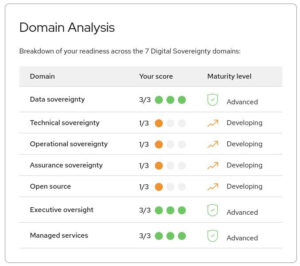The biggest question our man in Italy has about Linux distros and other open source software projects taking political stances is: do they do more harm than good?
More than twenty years ago, I co-founded the RULE — Run Up-to-Date Linux Everywhere project because “we didn’t like the tendency of GNU/Linux systems to become (in 2002!) fatter and slower on the same hardware at every release.”

RULE never had the resources to make that dream come true, but my dislike for bloated Free Software never faded. That’s why last month I was really happy to find, here on FOSS Force, the review of a modern, actively maintained Linux distribution that is equally suitable for old and new computers.
At the same time, however, both the review and the distro itself have confused and still worry me. I say so because the review is titled “antiX Linux: A ‘Proudly Anti-Fascist’ Distro That’s Suitable for Old and New Computers,” but all I found about that proud stance were three sentences in the review:
- “…antiX Linux centers its identity on an antifascist stance—surprisingly refreshing!”
- “…there’s definitely a left-wing vibe to this Greek distro, politically speaking.”
- “…the project was founded by someone who goes by the nom-de-guerre anticapitalista…”
And two banners on the antiX home page and forum:
- Home page: “Proudly anti-fascist ‘antiX Magic’ in an environment suitable for old and new computers.”
- antiX forum banner: “Forum for users of antiX Linux. Mean and Lean and Proudly anti-fascist.”
Hmm… OK. So what?
As of June 2025, there is nothing else at all about fascism and antifascism on the antiX Linux FAQ, main forum, other forum, Reddit, old wiki, and Facebook page, other than three old discussions that confirm my point.
So, what do all those declarations accomplish? Nothing, of course. That is, nothing concrete or positive. The review itself implicitly acknowledges this (emphasis mine):
“On the whole, antiX gets high marks across the board for providing a solid and usable Linux distribution to a wide range of hardware, as well as to a wide range of users.”
Translation: the only concrete value of antiX Linux — and the only thing worth knowing and flaunting about it — is how good this distribution is for everybody, fascists included.
The reason is obvious: there is nothing anti-fascist that antiX Linux the distribution (or any other operating system, of course) can do.
Nothing at all.
- The antiX Linux installer cannot detect fascists, or refuse to run on their computers — the latter is even built into open source.
- antiX Linux and its developers cannot prevent antiX Linux being used to write and promote Holocaust negationism, hate speech, etc. — also protected by the open source definition.
The same applies to the antiX Linux community: can it really prevent fascists, possibly with fake identities, from joining the forum and get technical support? Also, what’s unique in those banners? Don’t other Linux distributions have Codes of Conduct that explicitly forbid fascist or otherwise politically extreme activism?
At the end of the day, all the anti-fascism inside the antiX software really amounts to is that it was developed and packaged by anti-fascists. Philosophically, that makes sense, to the extent that every human product, being the result of the specific ideas and needs of its inventors, is never truly neutral. In practice, those claims are worth just as much as the claims that GNU software is anticapitalist because Stallman himself never liked fascist-friendly capitalist corporations. I mean, we all know GNU software is never used or usable by fascist-friendly corporations, right?
That’s why I’m confused and worried. The technical side of antiX Linux looks great. Seriously, I’m going to try it the next time I’ll have to resurrect some friend’s obsolete computer. But the “anti” part is half pointless and half harmful. The only concrete results that unenforceable home page banners like those may ever achieve are:
- They will be completely ignored by half the visitors.
- They’ll stave off actual fascists (yeah, right–no way), as well as many anti-fascist users and developers who don’t have the time or inclination to mix software with online political discussions.
- Eventually, they’ll bring more polarization in a world that really doesn’t need it.
Fifteen years ago, I felt compelled to write “Enough With This ‘Free Software Is Communist’ Myth! Please!” Today, I am concerned that a great Linux distribution is shooting itself in the foot, just when increasing inequality—coupled with tariffs that will make computers more expensive—would make it much more relevant for everyone.
Assuming the “Year of Linux Desktop” is still needed, it will never come if desktop Linux distros keep irritating potential users for no real reason or benefit.
Hopefully totally obvious—yet still unavoidable—disclaimer: it’s not the anti-fascism to which I object, only the attitude. Had antiX Linux been “proudly anti-communist,” I would have written exactly the same words.

Marco Fioretti is an aspiring polymath and idealist without illusions based in Rome, Italy. Marco met Linux, Free as in Freedom Software, and the Web pre-1.0 back in the ’90s while working as an ASIC/FPGA designer in Italy, Sweden, and Silicon Valley. This led to tech writing, including but not limited to hundreds of Free/Open Source tutorials. Over time, this odd combination of experiences has made Marco think way too much about the intersection of tech, ethics, and common sense, turning him into an independent scholar of “Human/digital studies” who yearns for a world with less, but much better, much more open and much more sensible tech than we have today.







I will agree with you that the term “anti-fascist” makes little sense for a Linux distro.
I do, however think that security, privacy, and sovereignty are elements that are useful to people in a fascist regime. and distributions that focus on this (and there are many) are useful to this audience. There are, of course projects that try to make this type of system easier to install, manage and use, such as freedombox.org, and particularly when matched with other functionality such as NextCloud and the Fediverse.party groups of software.
The other item that comes to mind from your writing was the conversation we had in the very early days of the Linux Kernel project. It was not a conversation that was unique to Linux, but had been going on for as long as I had been using software:
“I am not going to let the XXXX group of people use my software”, where “XXXX” was usually replaced by:
o government
o banks
o some political party
o some ethnic group
o some economic group
o military
o religion
and the list went on and on. The more rational of the people discussing this started drawing Venn diagrams and we rapidly found there was no intersection of all of the groups, which meant that no one would be able to use the software.
And so came the “Zeroth law” of the GPL, that anyone could use the software for any purpose, recognizing that you can not legislate morality through technology.
So, as you note, labeling the distribution as “anti-fascist” only heightens the concept that fascists will look at it.
I think there is value to the main developers announcing their political views instead of merely copy pasting a code of conduct into their repo. A code of conduct existing doesn’t mean it will be enforced correctly, equally, or even at all. Clearly stating “we’re anti fascist”, even without any detailed rules, inspires more trust in me as a member of a minority than the existence of a file. It makes me more willing to participate in forums, report bugs, write code, etc.
I would like to see your take on Anti-Something distros, where the “something” is a technical matter, not political. Like anti-systemd (artix, devuan and few others), etc.
Hello all, and:
1, thanks Maddog, I really appreciate your comment, and the historical background you added to support my point
2, to Goose, who wrote: “A code of conduct existing doesn’t mean it will be enforced correctly, equally, or even at all etc…”: the same applies, word by word, to the antiX banner. And lack of detailed rules means whoever wrote them, and he alone, gets to arbitrarily decide what’s right or wrong. This is not automatically bad, the Linux kernel works well exactly because Linus rules it. I do NOT think or mean that the antiX Linux developers are in bad faith!!! I am just pointing out that their statement carries the same guarantees of fair applicability as an ordinary code of conduct.
3, to James Whiterson… thanks for the tip, I’ll discuss it with the editor!
A typical code of conduct says nothing about who the developers are, people actually get really mad about it when it does instead of being generic (for example what happened about the one for SQLite). This makes sense because people take it as rules that may be enforced on them.
A statement of identity on the other hand is more like a promise. An anti fascist identity may seem like a vague promise if you don’t see the rise of fascism in your everyday life, but then you’re not someone who needs the promise.
To Goose, again: you wrote:
“An anti fascist identity may seem like a vague promise if you don’t see the rise of fascism in your everyday life…”
thanks for this. Yes, I do see that rise around. My point remains that, using your words, “making certain promises” ALSO in the specific “places” and contexts that are the topic of this article, that is places and contexts one could NEVER keep those promises at all , seems half useless, half harmful.
As is, that website and its authors cannot do anything AT ALL to stop a fascist with a fake identity to use their distro to promote fascism, getting all the support he needs. All it accomplishes, as far as that fascist is concerned, is to make that fascist happy that he a) tricked his adversaries, and he’s fighting them with their own weapons.
in the meantime, many people who are not actively fascists may simply go try another distro after seeing the banner, simply to avoid getting sucked in political discussions where and when they have no time for them.
Imagine a website, instead, saying “welcome” and nothing more in the home page, and having two pages like e.g.:
“What we do here”: to explain what the distro is, what it can do and nothing else, without any political statement
“Who we are” with author bios, personal motivations and all the political stances in full detail…
A website like that would welcome everyone, and be much more effective in letting everybody try the distro with an open mind, discover how good it is, and find out as a consequence how beneficial antifascism is.
I can’t speak for the developers, but I don’t think the point is to stop fascists from using the distro.
There’s software developed by people who turn out to be fascists after you interact with them for a while.
There are communities with “no politics” rules that mean people get excluded after society has made their very existence a topic of politics.
There are “centrists” who try to compromise with fascism, so that we get diluted fascism.
Yes, a developer could put in their personal profile that they personally won’t do any of that. And then it won’t get read. It’s better to make it the first thing users see.
If people are scared away by it, I expect they’re the same people who want to avoid anyone who is visibly queer or wears a symbol of a religion other than their own. The ones who think tolerance means telling people they are only allowed to be different in the privacy of their own home (or in the profile almost nobody reads).
Also… how large is the set of people who are so excluded from society they have to use a 20 year old computer, yet so conformist that they’re scared to use a distro developed by anti fascists? As for those who use very old computers by choice, in my experience we’re all at least a little weird and open minded.
Thanks for this discussion, I’m now going to be clear about who and what I am on my own projects. It is better to scare some people away instead of dealing with them when they go “I liked this software but can you please stop being a minority” when I have to speak up against discrimination sooner or later.